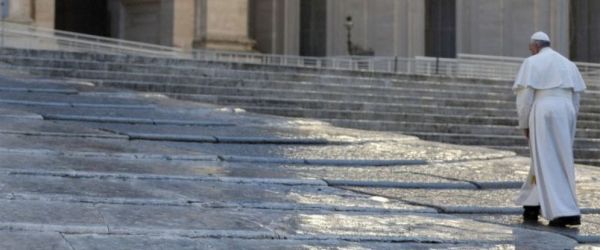The Gospel reading for this Sixth Sunday of Easter presents a passage of the discourse that Jesus addressed to the Apostles at the Last Supper (cf. Jn 14:23-29). He speaks about the work of the Holy Spirit and makes a promise: “the Counselor, the Holy Spirit, whom the Father will send in my name, he will teach you all things, and bring to your remembrance all that I have said to you” (v. 26). As the moment of the Cross approaches, Jesus reassures the Apostles that they will not be alone: the Holy Spirit will always be with them, the Paraclete, who will support them in the mission to deliver the Gospel throughout the world. In the original Greek language, the term “Paraclete” means the One who positions himself alongside, to support and comfort. Jesus returns to the Father, but continues to teach and inspire his disciples through the action of the Holy Spirit.
In what does the Holy Spirit’s mission, which Jesus promises as a gift, consist? He describes it himself: “he will teach you all things, and bring to your remembrance all that I have said to you”. Throughout his earthly life, Jesus already passed on all that he wanted to entrust to the Apostles: he fulfilled divine Revelation, namely, all that the Father wanted to impart to mankind with the incarnation of the Son. The Holy Spirit’s task is to remind, that is, to enable full understanding and to induce us to concretely implement Jesus’ teachings. And this is also precisely the mission of the Church, which she accomplishes through a precise way of life, characterized by a few requirements: faith in the Lord and observance of his Word; docility to the action of the Holy Spirit, who constantly renders the Risen Lord alive and present; acceptance of his peace and the witness borne to it through an attitude of openness and of encounter with the other.
To accomplish all of this the Church cannot remain static but, with the active participation of each baptized person, she is called to act as a community on a journey, enlivened and sustained by the light and power of the Holy Spirit who makes all things new. It is a matter of freeing oneself from worldly bonds represented by our views, our strategies, our objectives that often burden the journey of faith, and to place ourselves in docile listening to the Word of the Lord. Thus it is God’s Spirit who guides us and guides the Church, so that her authentic, beautiful and luminous face may shine, as Christ wished.
Today the Lord invites us to open our heart to the gift of the Holy Spirit, so that he may guide us on the paths of history. Day by day, he teaches us the logic of the Gospel, the logic of welcoming love, by ‘teaching us all things’ and reminding us ‘of all the Lord has said to us’.
May Mary, whom in this month of May we venerate and to whom we pray with special devotion as our heavenly mother, always protect the Church and the whole of humanity. May she who, with humble and courageous faith, fully cooperated with the Holy Spirit for the incarnation of the Son of God, help us too to allow ourselves to be taught and guided by the Paraclete, so that we may welcome the Word of God and witness to it with our lives.
[Pope Francis, Regina Coeli 26 May 2019]












